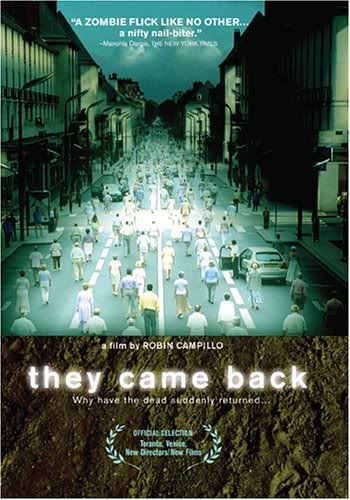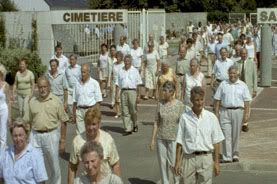They Came Back-2004

In a nameless French town, 13,000 persons who have passed away within the previous ten years have mysteriously comeback. It is apparently a worldwide phenomenon, with about 70,000 recently deceased returning to the living realm. The deceased return well kempt, with a high resistance to infection and a slightly lower than normal body temperature. They’re also, obviously, not quite the same as they once were when alive.

The city is at a bit of a loss as to what to do with them, and over the course of about a month, they conduct research, they do tests, they try to figure out what makes these people tick. The deceased are slow to communicate, they have lapses of awareness, and though their motor functions seem unharmed, they have a certain sluggishness about them. And although they don’t sleep; they’re always moving. The other problem the city faces is how exactly to allow these people to become productive members of society, and, in the process of attempting to solve this problem, the inevitable prejudice and class issues arise.
Upon their arrival, the deceased—or, “returnees”—are given the refugee treatment and herded into the city’s civic center to wait away the hours, days, or weeks until a family member comes to claim them…if they are claimed at all.
The thing this film does best is addressing an issue that is so rarely openly tackled: grief and mourning. And it does this in a very unique way—instead of talking about the process of grief as something to get-through and overcome, this film somehow turns the issue of its head.

When we lose a loved one, we mourn, we suffer, we long for their return. We vow that there is a void that can never, ever be again filled. This film makes you question whether that’s actually true. The fact is that the void does fill—it fills physically with other people, and it fills emotionally through the treacherous work on the part of the mourner—it takes a lot to get on with life after losing someone close. So much so that upon they’re re-arrival…you might not know what to do.
Les Revenants allows us to examine the different reactions of those who had been left behind, and who have been returned to: An elderly man who lost his wife, a couple who had lost their 6 year old son, and a young woman who lost her live-in boyfriend. All react differently in what seems to me a perfectly unimaginable situation.
In the end, the question of how these people could be integrated back into the society they left behind is answered; they can’t. And the living are the last to realize this, though the dead seem to catch on rather quickly, despite their torpid drifting. Contrary to what we insist is true, there really isn’t an eternally empty void left behind—reality changes, we change with it, and we go on.


0 Comments:
Post a Comment
<< Home